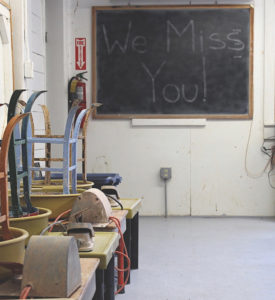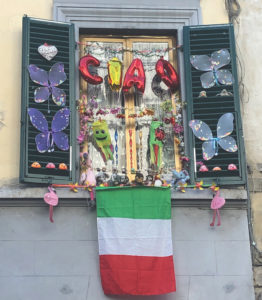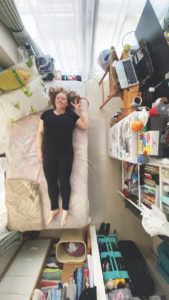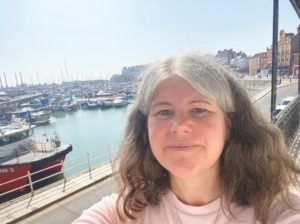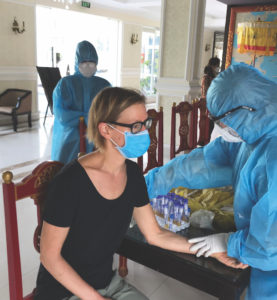As we move toward a new normal, locally and globally, strict lockdowns are being modified, masks have become a fashion trend, and the Outer Cape enters the season that once brought visitors from around the world. As summer beckons, the Independent checks in once more with friends from afar.
Black River, Jamaica
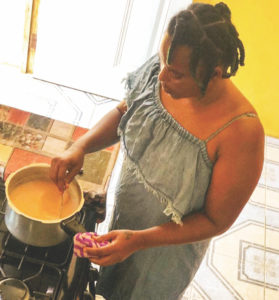
Carla Henry describes herself as a “self-motivated and ambitious woman.” A chef by profession, she lives in the town of Black River, Jamaica, with her father and 14-year-old son, Rahiem. For the past four years, Henry has been employed by Mac’s Seafood on the Outer Cape during the season. Though she intended to start work in April, her plans are now indefinitely on hold.
“The Covid-19 pandemic has impacted me gravely, as I am unable to generate the income that helps me to provide for my family,” Henry says. “I wish I had understood better what a toll this virus would take on our society, our everyday lives, and our economy.”
Rahiem’s school has switched to online classes, and Henry now spends most of her time at home, obeying curfews and social distancing rules. “The persons in my household are trying our best to stay calm, keep a clear mind, and think positive thoughts in these stressful times,” she says. “We catch up on family time while staying safe in our home.”
Henry feels that the people of Black River are holding together well as a community. “Wearing a mask when going to the grocery store or running errands is mandatory,” she says. “People are following the measures put in place by the government and are taking health precautions seriously.” On Sundays, neighbors play music and sing from their homes “to remind us of church services, because churches are closed due to social distancing. Their positivity and vibrance give me hope that we can overcome this crisis and create a brighter future moving forward.”
Blekinge County, Sweden
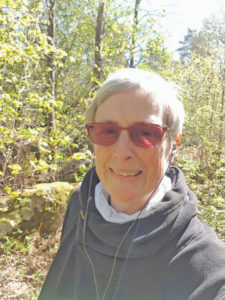
Annika Hogg Johnsson was born on Cape Cod to a Swedish mother and local father, Herb Hogg, who ran a bakery famous for its Swedish coffee cake on Massasoit Road in Eastham. Johnsson attended Nauset Regional High School and met her Swedish husband of 42 years, Peter, in Provincetown. “He was a sailor on a Swedish ship anchored in P’town,” she says. “My father and mother were members of a Swedish-American Vasa lodge, and we welcomed the boys on the ship.”
The couple now live in the tiny village of Åryd in Blekinge County in southern Sweden. During the Covid-19 crisis, “Our situation hasn’t changed that much,” Johnsson says. The Swedish government chose not to impose a full lockdown, she explains, though high schools are closed and homes for the elderly do not allow visitors. Those who can, work from home. Music festivals and large gatherings have been canceled. Yet elementary and middle schools have remained open, as have stores, with hours set aside for those at risk.
Although Sweden has seen higher rates of Covid-19 infection and deaths than neighboring Scandinavian countries where stricter measures were imposed, Johnsson doesn’t feel that Swedes are worried. “I think our country has done a pretty good job,” she says. “I have asthma, so I’m staying at home for the most part, except for walks in the woods.”
Johnsson was hoping to make her usual trip to Cape Cod this September but expects that won’t be possible. To her friends and family here, she says: “Take care, be respectful of one another. And why, for goodness’ sake, is toilet paper more important than food? As long as you have soap and water to wash yourself with, toilet paper is obsolete!”
Viersen, Germany

Rüdiger and Susanne Schmitz live in the town of Viersen in North Rhine-Westphalia, Germany. While in high school, Rüdiger was an exchange student in Staten Island, N.Y., and has remained in contact with his host family. In 2002, a joint vacation brought the Schmitzes to Wellfleet for the first time.
“We were smitten and knew that this is where we wanted a second home,” Susanne says. Nine years ago, they realized their dream and built a house in Wellfleet. The Schmitzes left the Cape in February and hoped to return for the spring and summer. “We had no idea how long it would be before we could come back,” Susanne says.
Germany is gradually reopening this week, after sheltering in place since March. Though Susanne says that some in her community did not seem to take the situation seriously enough at first, most have been following guidelines. “Lifting the lockdown will inevitably bring us all closer together again, so now it is time for everyone to act responsibly and understand the risks.”
Susanne’s elderly parents live in Bonn, where she was born, and her mother recently had two small strokes. “It’s very hard not to be able to visit,” Susanne says, “but I know that she is doing well, and I trust we won’t have to stay apart for much longer. I have gained a lot of trust over the past weeks. I try not to watch the news too often. What feels important is to stay positive, hopeful, and patient,” she adds.
Dunholme, England
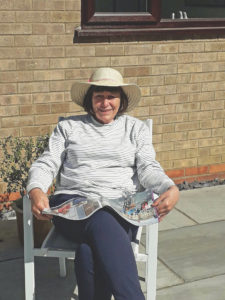
Elizabeth “Whiz” Collis, 78, lost her partner three years ago and lives alone. She moved to the small village of Dunholme, near Lincoln, England, not long before the current crisis, to be closer to her daughter Catrin Rodda and grandchildren. Collis’s eldest daughter, Sian Robertson, is an artist in Truro (and office assistant at the Independent), and her son, Dave Rees, lives in Australia. “We are far-flung!” she says, laughing.
Collis’s life has changed considerably. Before Covid-19, “I helped out with reading in the local primary school, and I joined the fortnightly Scrabble club, the Dunholme Ladies Group for the monthly lectures, a local art class, and, in Lincoln, a film society,” she says. While she feels fortunate to be healthy, being isolated has been challenging, even though “I was born during World War II and was brought up with restrictions and rationing,” she says. “I see my daughter doing two jobs from home, overseeing one child in homeschool, and trying to keep the teenager happy. I realize how lucky I am that my daughter visits my garden and we can talk as long as we keep meters apart. She recently got a puppy, which she brought ’round. The puppy came up to me and, hugging her, I promptly broke into tears, as this was the first living body I had held in five weeks. The lack of touch from family and friends is hard.”
Being a retired psychotherapist helps Collis cope. “I find the fears and anxiety perplexing,” she says. “Sometimes I feel fine, then suddenly I go into weepy, ‘poor little me!’ mode. I think I eat more comfort food, as I know I am putting on weight. Porridge with cream on! I know this cannot last forever, and with luck, I will see it out.”
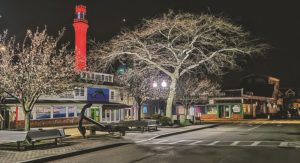 As of May 11, Provincetown had one confirmed active case of coronavirus, one death, and 26 additional cases considered recovered.
As of May 11, Provincetown had one confirmed active case of coronavirus, one death, and 26 additional cases considered recovered.
 Last week I was grateful for my parents. I couldn’t ask for better parents. They always try to work hard and take care of each other and my sister and me. My parents barely get a moment to themselves, especially with a boy who’s turning 14 this Saturday and 4-year-old girl who WILL NOT STOP MAKING NOISE FOR TWO SECONDS. It’s near impossible to get my dad to stop working even for half a second, and my mom always pushes me to do better. She’s the glue and my dad’s the foundation, she holds us together and he holds us up. —Khalil Green, grade 8
Last week I was grateful for my parents. I couldn’t ask for better parents. They always try to work hard and take care of each other and my sister and me. My parents barely get a moment to themselves, especially with a boy who’s turning 14 this Saturday and 4-year-old girl who WILL NOT STOP MAKING NOISE FOR TWO SECONDS. It’s near impossible to get my dad to stop working even for half a second, and my mom always pushes me to do better. She’s the glue and my dad’s the foundation, she holds us together and he holds us up. —Khalil Green, grade 8 Last week I was grateful for being in my bed all day, texting and making new friends. This quarantine has been an eye opener. I’ve got time to think about stuff that has been going on in my life more deeply. It’s not that I really enjoy quarantine, but we’ve got to make time for ourselves sometimes. People on a daily basis forget about themselves, but this quarantine is forcing them to try. I was grateful for things like understanding myself a little bit better. What I mean by that is, relationship-wise and things that I’m interested in. Things that I don’t want to do or be. —Jemone Rose, grade 8
Last week I was grateful for being in my bed all day, texting and making new friends. This quarantine has been an eye opener. I’ve got time to think about stuff that has been going on in my life more deeply. It’s not that I really enjoy quarantine, but we’ve got to make time for ourselves sometimes. People on a daily basis forget about themselves, but this quarantine is forcing them to try. I was grateful for things like understanding myself a little bit better. What I mean by that is, relationship-wise and things that I’m interested in. Things that I don’t want to do or be. —Jemone Rose, grade 8 Moving
Moving I kind of love “coronacation,” because it’s also bringing my family close together because we are home together every day so we kind of have to be. I love making TikToks with them. I love being in the living room and having laughs and watching movies. I love how if and when we go back to school, I don’t have to be fake anymore. I can be me and express myself. I can’t wait ’til it’s summer so my family can go to the pond like we always do, plus with the babies this time. And in August my brother turns one. I’m happy that at least now I can learn at home and teach myself stuff that my dad wants me to learn. I can’t wait to see all my friends again. —Toni-Anne Fraser, grade 7
I kind of love “coronacation,” because it’s also bringing my family close together because we are home together every day so we kind of have to be. I love making TikToks with them. I love being in the living room and having laughs and watching movies. I love how if and when we go back to school, I don’t have to be fake anymore. I can be me and express myself. I can’t wait ’til it’s summer so my family can go to the pond like we always do, plus with the babies this time. And in August my brother turns one. I’m happy that at least now I can learn at home and teach myself stuff that my dad wants me to learn. I can’t wait to see all my friends again. —Toni-Anne Fraser, grade 7 I fear that I’ll get it and spread it to my mom and Wyatt. Since he has heart problems, he is more capable of getting it and my mom is not really elderly but she could still get it and die. I fear that we will not be able to go to school for a really long time. I fear that I am going to die and my family, too. I also fear that I am going to have a crappy birthday and not be able to go go-karting that I want to do really bad. —Andres Vida, grade 6
I fear that I’ll get it and spread it to my mom and Wyatt. Since he has heart problems, he is more capable of getting it and my mom is not really elderly but she could still get it and die. I fear that we will not be able to go to school for a really long time. I fear that I am going to die and my family, too. I also fear that I am going to have a crappy birthday and not be able to go go-karting that I want to do really bad. —Andres Vida, grade 6 I am afraid about how this is so uncertain with tons of fake news and conspiracy theories and I am afraid about how this will end. Also, I know that it is human nature to be afraid of the uncertain, which is probably why we have conspiracy theories. —Jack Hopkins, grade 6
I am afraid about how this is so uncertain with tons of fake news and conspiracy theories and I am afraid about how this will end. Also, I know that it is human nature to be afraid of the uncertain, which is probably why we have conspiracy theories. —Jack Hopkins, grade 6